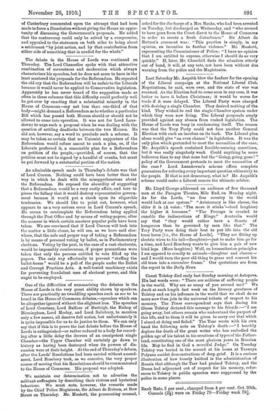The debate in the House of Lords was continued on
Thursday. The Lord Chancellor spoke with that attractive combination of earnestness and moderation which always characterises his speeches, but he does not seem to have in the least mastered the proposals for the Referendum. He repeated the old cry that the Referendum will be unfair to the Liberals because it would never be applied to Conservative legislation. Apparently he has never heard of the suggestion made so often in these columns that this difficulty could perfectly well be got over by enacting that a substantial minority in the House of Commons—say not less than one-third of that body—might demand a Referendum as to whether a particular Bill which has passed both Houses should or should not be allowed to come into operation. It was not for Lord Lans- downe to urge such a proposal when he was dealing with the question of settling deadlocks between the two Houses. He did not, however, say a word to preclude such a scheme. It may be taken as certain that no Unionist supporters of the Referendum would refuse assent to such a plan, or, if the Liberals preferred it, a reasonable plan for a Referendum on petition of the people,—provided, of course, that the petition must not be signed by a handful of cranks, but must be put forward by a substantial portion of the nation.


















































 Previous page
Previous page